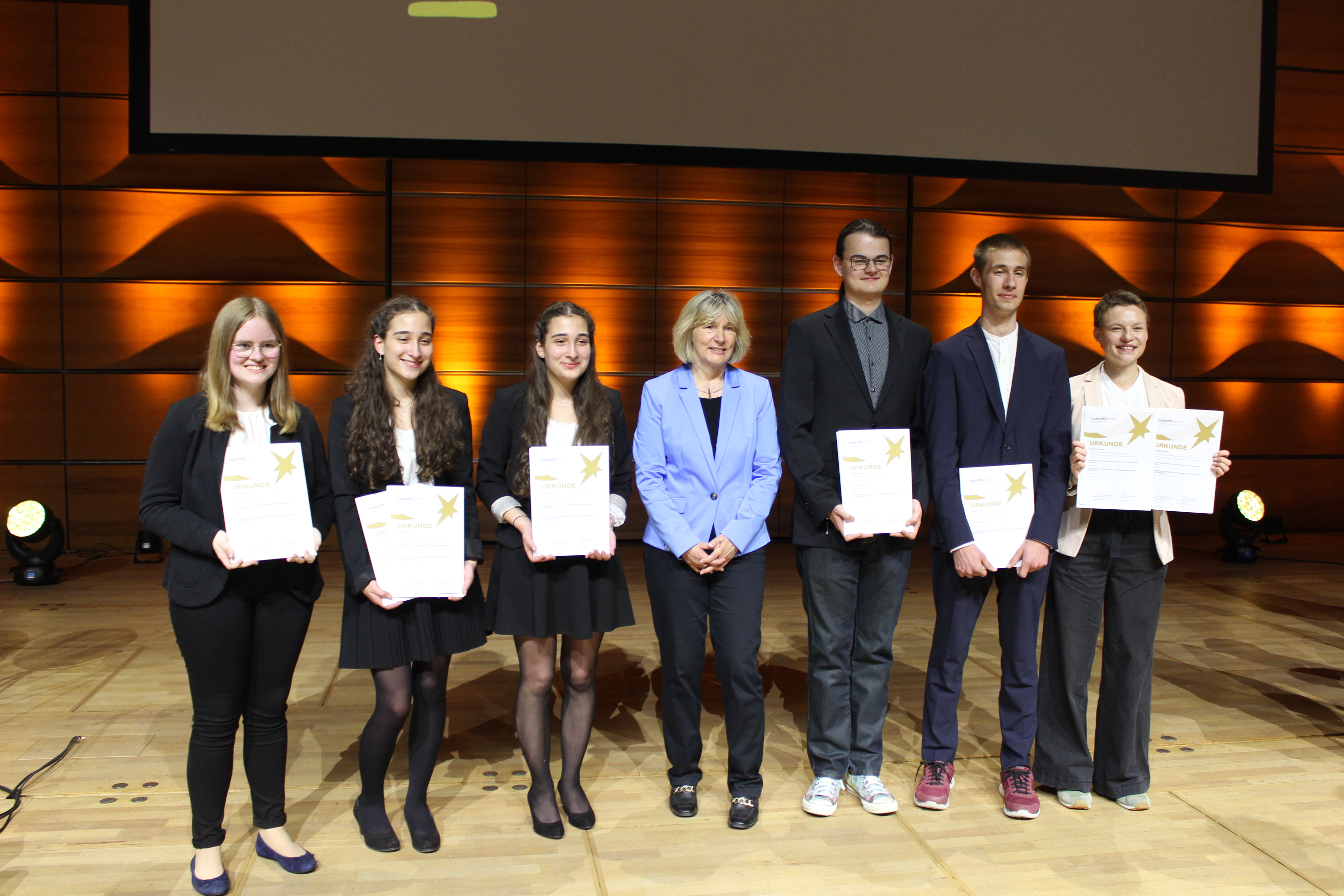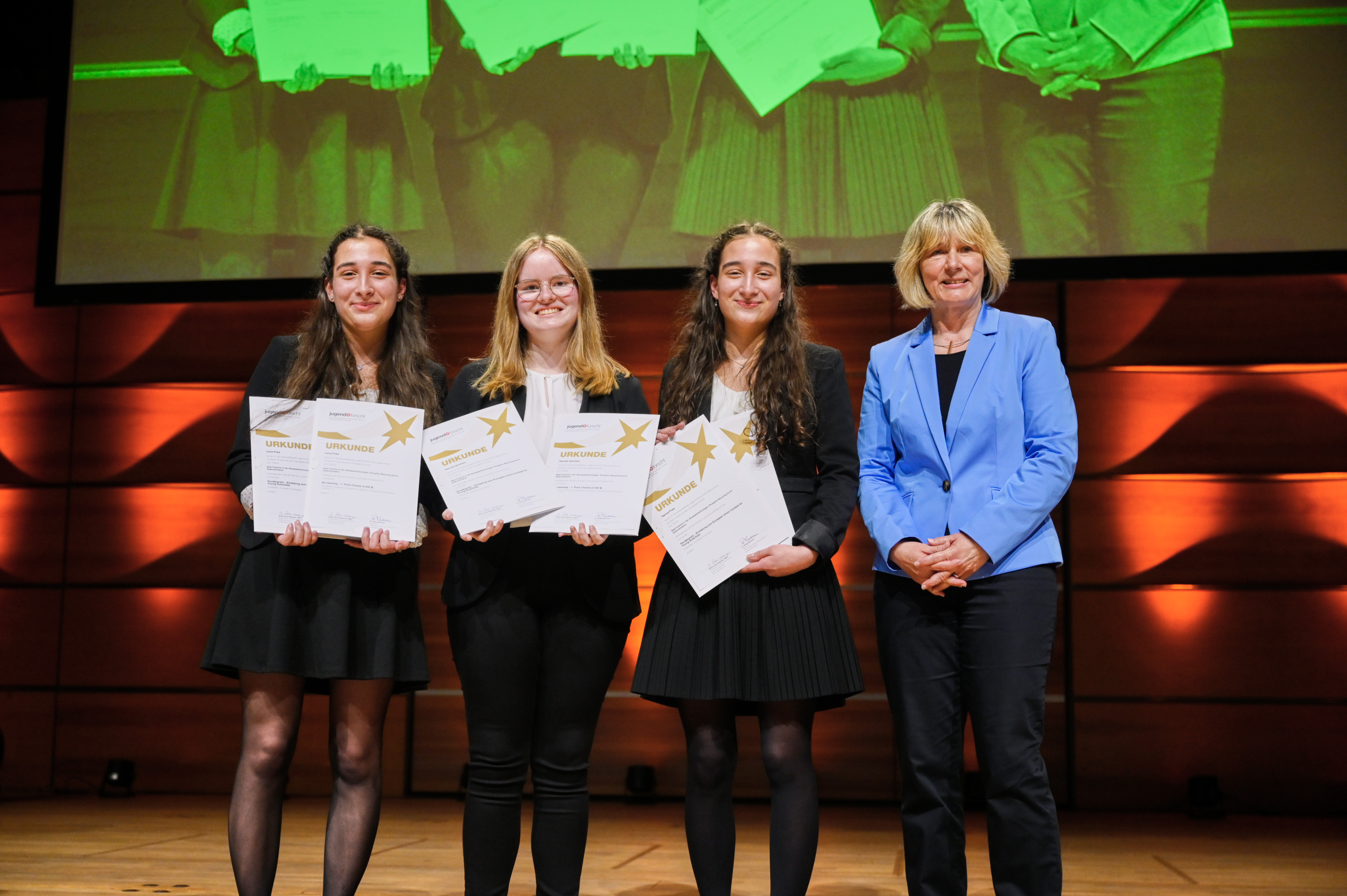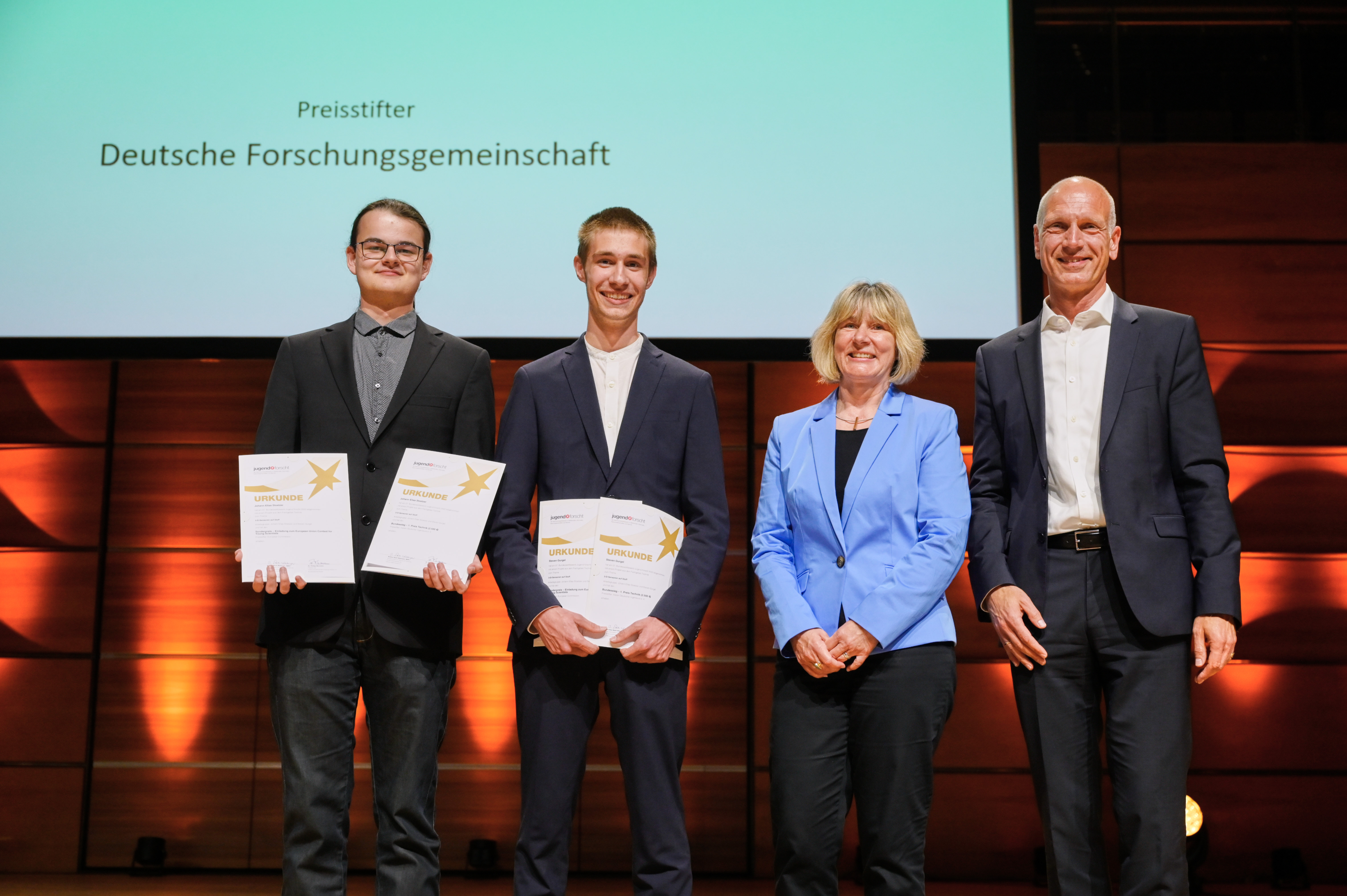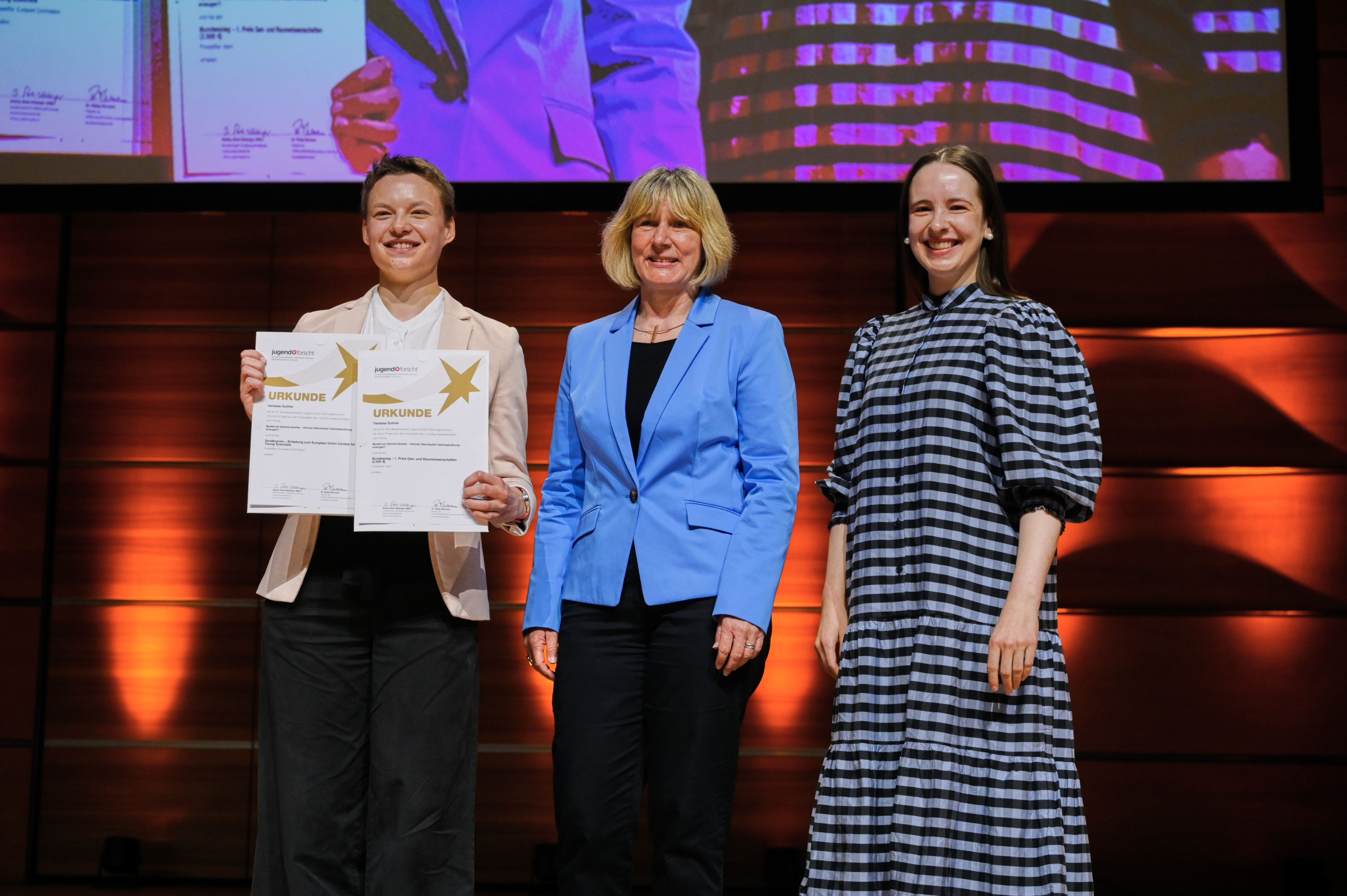Europa Prize 2022

europa_preis_gruppenfoto

Group picture: Hannah Amrhein, Hanna Fries, Lena Fries, Frau Dr. Heide Ahrens, Johann Elias Stoetzer, Steven Gurgel und Vanessa Guthier
© DFG
Group picture: Hannah Amrhein, Hanna Fries, Lena Fries, Frau Dr. Heide Ahrens, Johann Elias Stoetzer, Steven Gurgel und Vanessa Guthier
© DFG
The Deutsche Forschungsgemeinschaft (DFG, German Research Foundation) has awarded its Europa Prize to selected winners of the national Jugend forscht competition. Six young researchers – four female and two male – recently received the award at the Jugend forscht finals in Lübeck in various competition categories, in addition to their national prize. The aim of the DFG Europa Prize is to prepare the winners for the European Union Contest for Young Scientists (EUCYS) in Leiden in September.
This year the DFG’s Europa Prize goes to two research teams and one individual female researcher.

europa_preis_2022_01

The national prizewinners in the field of chemistry (from left to right): Lena Fries, Hannah Amrhein and Hanna Fries. The Europa-Preis was handed over by Dr. Heide Ahrens, Secretary General of the DFG.
© Stiftung Jugend forscht e. V./ Forschungsforum Schleswig-Holstein e.V.
The national prizewinners in the field of chemistry (from left to right): Lena Fries, Hannah Amrhein and Hanna Fries. The Europa-Preis was handed over by Dr. Heide Ahrens, Secretary General of the DFG.
© Stiftung Jugend forscht e. V./ Forschungsforum Schleswig-Holstein e.V.
The three young Bavarian researchers Hannah Amrhein (17), Lena Fries (16) and Hanna Fries (16) received the Europa Prize in addition to winning the national prize in the field of chemistry. In the lab they came up with a method for recovering more than 80 percent of the valuable plant nutrient phosphorus from wastewater. For this purpose they used “electroflotation”, a method by which tiny flakes bind phosphates and transport them to the surface in an electric field. The method is apparently more effective than the process normally used in sewage treatment plants.

europa_preis_2022_02

The national prizewinners in the field of technology (from left to right): Johann Elias Stoetzer and Steven Gurgel. The Europa-Preis was handed over by Dr. Heide Ahrens, and they received the 1st prize from Dipl.-Ing. Sven Warnck, Chairman of the VDI.
© Stiftung Jugend forscht e. V./ Forschungsforum Schleswig-Holstein e.V.
The national prizewinners in the field of technology (from left to right): Johann Elias Stoetzer and Steven Gurgel. The Europa-Preis was handed over by Dr. Heide Ahrens, and they received the 1st prize from Dipl.-Ing. Sven Warnck, Chairman of the VDI.
© Stiftung Jugend forscht e. V./ Forschungsforum Schleswig-Holstein e.V.
In the field of technology, the jury were most impressed by the duo Johann Elias Stoetzer (17) and Steven Gurgel (17) from Berlin, who expanded the capabilities of their 3D printer by adding industrial carbon black to plastic. In doing so, they succeeded in producing electrically conductive circuits that can be used as sensors to measure forces, contacts and bending processes. The young researchers were even able to print their 3D sensors on textile, thereby enabling a wide range of new applications.

europa_preis_2022_03

The national prizewinner in in the field of earth and spatial sciences: Vanessa Guthier. The 1st prize was handed over by Laura-Lena Förster (right), Deputy Editor-in-Chief of the magazine stern, the Europe Prize by Dr. Heide Ahrens (centre).
© Stiftung Jugend forscht e. V./ Forschungsforum Schleswig-Holstein e.V.
The national prizewinner in in the field of earth and spatial sciences: Vanessa Guthier. The 1st prize was handed over by Laura-Lena Förster (right), Deputy Editor-in-Chief of the magazine stern, the Europe Prize by Dr. Heide Ahrens (centre).
© Stiftung Jugend forscht e. V./ Forschungsforum Schleswig-Holstein e.V.
Another young researcher to be awarded the Europa Prize was Vanessa Guthier (18) from Saxony-Anhalt who emerged as the winner in the field of earth and spatial sciences. She wrote programmes for the statistical analysis of data from catalogues relating to star clusters and gamma radiation resulting from the interactions between them. In this way she was able to demonstrate the conditions under which such radiation is produced. The results could help understand such phenomena even better in the future.
The DFG Europa Prize was presented to the six Jugend forscht winners by DFG Secretary General Dr. Heide Ahrens, with each team/individual researcher receiving €1,000.
The DFG established the prize in 2010 with the aim of highlighting the importance of internationalisation for a successful research career. For this reason, the young researchers will enter the European Union Contest for Young Scientists (EUCYS), which this year is due to be held from 13 to 18 September in Leiden. In preparation, they will receive supervision and support from mentors. The latter are selected by the DFG from among the early-career researchers it provides funding for, such as those financed under the Emmy Noether Programme. Another aim here is to promote lasting links among the different generations of researchers.
Further Information
For details of this year’s Jugend forscht winners, see: